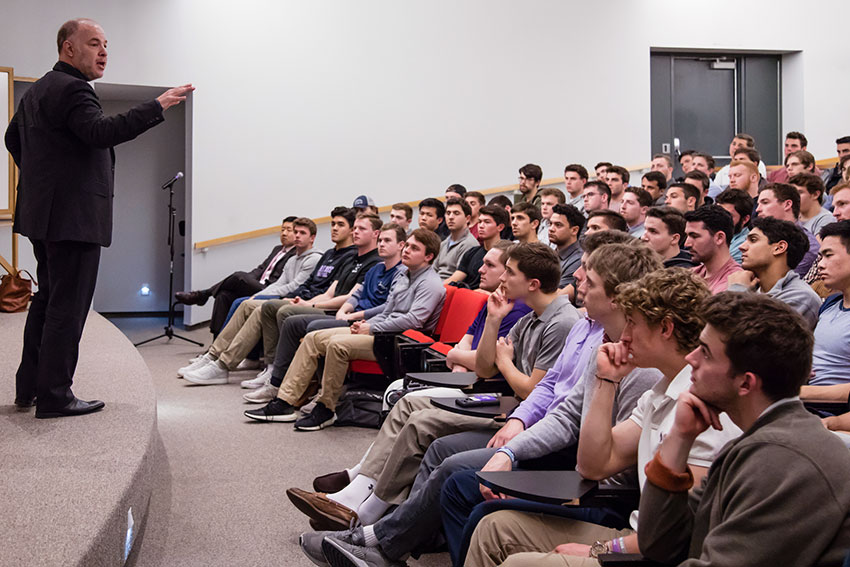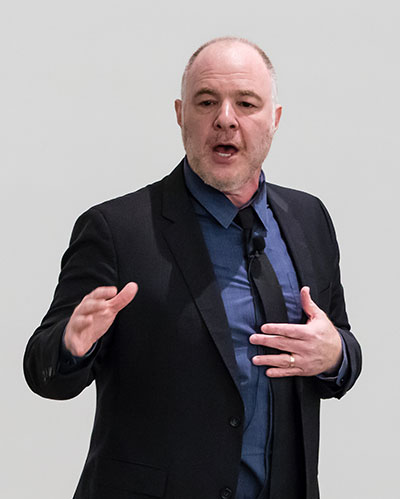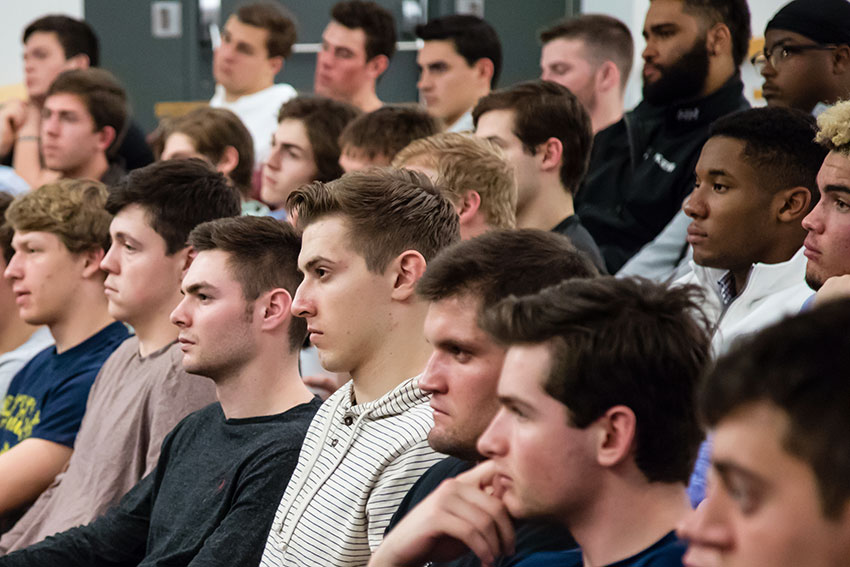
If you identify as a woman, and go to events on the issue of gender violence, you know that old demoralized feeling: time and again, only a handful of men (if any) show up to join you.
Which is why the scene at Stirn Auditorium on Tuesday night was so striking. Jackson Katz, the renowned gender violence prevention educator, had come to speak—to an audience that was 95 percent male.
Jon Thompson, the men’s lacrosse head coach, gladly justified their presence: “Gender violence is not a ‘women’s issue.’ It’s an ‘everyone’s issue.’”

Coach Thompson had urged his players to show tonight. Many other coaches of men’s sports, including baseball, basketball, football and hockey, had done the same. Athletics Director Don Faulstick was there too.
The room was packed at near capacity with 194 people.
Amanda Vann, director of health education, welcomed Katz. Jonathan Paul ’22, one of Amherst’s 14 peer advocates of sexual respect, introduced him.
Katz’s presentation, “Men and #MeToo,” was long and impassioned. “Gender violence has been seen as a women’s issue with some good men helping out,” he said. “But I have big problem with that. I don’t accept that.”
He then spelled out how “women’s leadership has been utterly world-changing.” Before the 1970s, “the whole architecture that we take for granted wasn’t here,” but women came together to fund battered women’s shelters, and pushed to hold offenders accountable. “Yet somehow many men have pushed back at the feminist movement—insulting and criticizing women. I’m disgusted by how they call women names—and I think it’s also a ridiculous point of view. This isn’t a zero-sum game. Boys and men benefit from their work as much as girls and women.”
This led to a point about those who commit mass killings: 99 percent of them are male**. “Imagine if girls did 99 percent of the shooting, then everyone would say ‘What’s going on with girls?’” It’s so commonplace that shooters are men—but men will get defensive if the issue is framed that way, added Katz. The good guys object to being lumped in with the bad guys.
It follows that, if student athletes are frustrated at being painted as “dumb jocks or disproportionally involved in sexual assault, I say you have two choices,” Katz continued. “You can hunker into a defensive crouch or you can use your platform and start speaking up and defeat the stereotype with your actions and be a leader.”
That means calling out a friend who makes a sexist joke, for instance. “It’s really difficult to interrupt,” Katz admitted. “But leadership means taking some risks. If it wasn’t difficult, it wouldn’t require leadership.”
To demonstrate such leadership, Katz aired a viral video in which an Australian general condemns male soldiers who had posted sexist comments on female soldiers. “Imagine if men at all levels say it and mean it like this general,” Katz exclaimed. “Imagine if that was normative in our society—we would have radically reduced levels of domestic abuse and sexual harassment.”
He also mentioned a training exercise in which he asks men what they do, in their daily life, to protect themselves against sexual assault. The guaranteed response? Uncomfortable silence. Do? They do nothing, it never crosses their mind. Ask women, though, and dozens of answers fly forth, from not living in a ground floor apartment, to not leaving a drink unattended at a bar, to never traveling alone.

As for #MeToo specifically, Katz had this to say: “Amherst is an elite institution shaping the next generation of leadership in this country. You’re going to do plenty of interesting and important things.” Gender violence and harassment prevention have to be “part of your portfolio of leadership” in the workplace, he said.
“This is a challenge to your generation,” he said: “ to use what you know to create new social norms in the peer culture. We need your leadership.” He then challenged the men in the room to join the long tradition of athletes who stand up for social justice, from Muhammad Ali speaking out against the Vietnam War to today’s football players who take a knee.
Katz wound down by hoping that what he said tonight would, one day, seem so obvious. That in the years to come it would be standard practice for men to engage on the topic of gender violence and harassment prevention: “I hope what I do will be seen as some weird artifact of history.”
Afterward, a few athletes reflected. “This was inspiring,” said Alexis Chavez-Salinas ’22, who is on the football team. Added baseball player Rob Casey ’20: “I know our team will continue this discussion way past tonight.”
**Clarification: The 10th paragraph of this story has been changed from the original to use the word male instead of men in paraphrasing Katz. In his talk, Katz used the word men when discussing perpetrators of mass (non-school) shootings and boys when discussing perpetrators of school shootings (in the same way he uses girls later in the paragraph). In this context, male is best word to use, because it's more comprehensive.